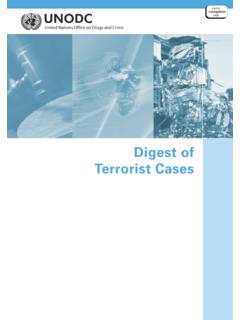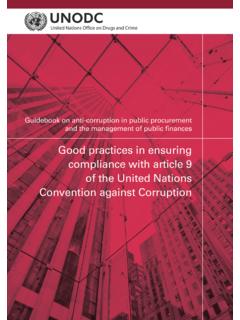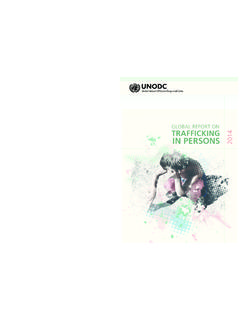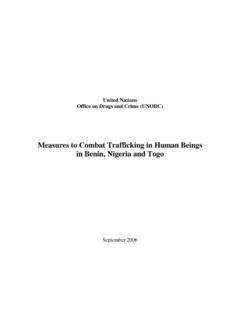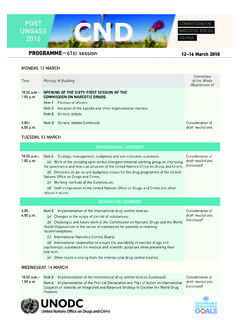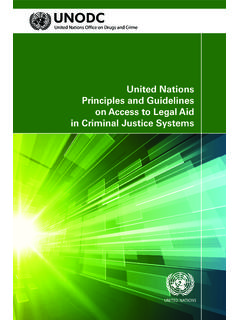Transcription of Handbook on Criminal Justice Responses to …
1 Handbook onCriminal Justice Responses to TerrorismUnited nations publicationISBN 978-92-1-130270-7 Sales No. Justice Handbook SERIESUNITED nations office ON DRUGS AND CRIMEV iennaHandbook on Criminal Justice Responses to TerrorismCRIMINAL Justice Handbook SERIESUNITED NATIONSNew York, 2009 AcknowledgementsThe Handbook on Criminal Justice Responses to terrorism was fi nalized drawing on texts prepared by Yvon Dandurand (Dean of Research and Industry Liaison, University of the Fraser Valley, Canada; and Senior Associate, International Centre for Criminal Law Reform and Criminal Justice Policy) under a consultancy contract for the united nations Offi ce on Drugs and crime (UNODC).
2 The draft text was reviewed at an expert group meeting held at UNODC headquarters in Vienna on 1 and 2 October 2007. UNODC wishes to acknowledge the valuable contributions received from the following experts who participated in that meeting: Christian Ahlund, Andrea Bianchi, Marvin Carvajal Perez, Anne Charbord, Michael De Feo, Helen Duffy, Anton du Plessis, Mark Ellis, John Grieve, Tiyanjana Maluwa, Joanne Mariner, Veronica Milinchuk, Vivienne O Connor, Robin Palmer, Andrew Powell, Cathy Powell, Colette Rausch, Rachid Sadouk, Mark Shaw, Masamba Sita and Jayampathy Wickramaratne. This publication was fi nanced drawing on funds provided by the following countries, having made voluntary contributions to the UNODC Global Project on Strengthening the Legal Regime against terrorism : Austria, Belgium, Canada, Colombia, Denmark, France, Germany, Greece, Italy, Japan, Liechtenstein, Monaco, Neth-erlands, New Zealand, Norway, Spain, Sweden, Switzerland, Turkey, united Kingdom of Great Britain and Northern Ireland and united States of nations PUBLICATIONS ales No.
3 ISBN 978-92-1-130270-7iiiContentsPart OneIntroduction and legal context I. INTRODUCTION .. 3 II. IMPORTANCE OF AN EFFECTIVE RULE OF LAW-BASED Criminal Justice response TO terrorism .. 5 III. terrorism AND INTERNATIONAL LAW .. 9 A. Universal legal regime against terrorism .. 10 B. Importance of international cooperation .. 15 C. International human rights law .. 17 D. International refugee law .. 24 E. International humanitarian law .. 27 F. terrorism and transnational organized crime .. 28 Part TwoKey components of an effective Criminal Justice response to terrorism I. INTRODUCTION .. 33 II.
4 ROLE OF POLICYMAKERS AND LEGISLATORS .. 35 A. Legislative incorporation of international obligations .. 35 B. Criminalization .. 36 C. Procedural law .. 40 III. ROLE OF LAW ENFORCEMENT .. 49 A. Methods of investigation .. 50 B. Arrest and detention .. 54 C. Interrogation and interviewing of suspects .. 57 D. Preventing obstructions of Justice .. 58 E. Witness protection measures and programmes .. 60 F. Gathering of fi nancial information .. 61 G. Community engagement .. 63 H. International law enforcement cooperation .. 63 I. Extraordinary measures .. 69 IV. ROLE OF PROSECUTORS.
5 73 A. Independence of the prosecution .. 73 B. Role of prosecutors in upholding the rule of law .. 74iv C. Obligation to extradite or prosecute .. 75 D. Extradition .. 75 E. Mutual legal assistance .. 78 F. Increasing a system s capacity for international cooperation .. 81 V. ROLE OF DEFENCE COUNSEL .. 83 A. Principle of equality of arms .. 84 B. Right to legal assistance .. 85 C. Exceptional measures .. 86 VI. ROLE OF THE JUDICIARY .. 89 A. Independence, impartiality and integrity of the judiciary .. 90 B. Independence and impartiality of tribunals .. 91 C.
6 Security of the courts .. 93 VII. ISSUES AND CHALLENGES CONCERNING DETENTION .. 95 A. Detention prior to adjudication or during investigation .. 96 B. Conditions of detention and custody .. 97 C. Cruel or inhuman treatment or punishment .. 97 D. Security and safety of prisoners .. 101 E. Transfer of detainees and prisoners .. 102 F. Preventive detention .. 103 G. Complaint procedures .. 104 VIII. ROLE OF THE Criminal Justice SYSTEM IN PROTECTING THE RIGHTS OF VICTIMS OF TERRORIST CRIMES .. 107 A. Victims in international law .. 108 B. Defi nition of the term victims .. 109 C.
7 Responding to the needs of victims of terrorism .. 109 D. Improving the Criminal Justice system s response to victims .. 110 Part ThreeCriminal Justice accountability and oversight mechanisms I. OVERSIGHT OF LAW ENFORCEMENT .. 115 II. OVERSIGHT OF LAWYERS AND PROSECUTORS .. 119 III. OVERSIGHT OF THE JUDICIARY .. 123 IV. PRISON OVERSIGHT AND INSPECTIONS .. 125 Conclusion .. 126 Annex. Useful tools and resources .. 127 Part oneIntroduction and legal context3I. IntroductionAn effective and prevention-focused response to terrorism should include a strong Criminal Justice element: one that is guided by a normative legal framework and embedded in the core principles of the rule of law, due process and respect for human rights.
8 Perpetrators of terrorist acts as defi ned in the universal legal instruments against terrorism are crimi-nals, and they should therefore be dealt with by the Criminal Justice process as it is the most appro priate and fair mechanism to ensure that Justice is achieved and that the rights of the accused are protected. In addition to this core function, Criminal Justice approaches to terrorism also provide for effective prevention mechanisms, including interventions that target the funding of terrorists and terrorist organizations and allow for the interception of conspiracies to commit attacks and the prohibition of incitement to terrorism . To provide an effective Criminal Justice response to terrorism , States need adequately functioning counter- terrorism legal regimes and Criminal Justice systems, as well as the related capacity to deal with potentially complex Criminal cases and engage effectively in international Criminal Justice cooperation.
9 This requires a fi rm commitment by States to pursue common objectives at the national, subregional and regional essential part of a comprehensive Criminal Justice response is the widespread ratifi ca-tion and implementation of the universal legal instruments against terrorism (meaning simply the relevant multilateral treaties and supplemental agreements). In this regard, the technical assistance provided by the united nations Offi ce on Drugs and crime (UNODC) is particularly important as it supports not only the efforts of Member States to ratify and implement the relevant counter- terrorism instruments, but also their efforts to strengthen the rule of law and build the capacity of their law enforcement and Criminal Justice offi cials to apply these laws effectively and is cognizant of the need for a holistic approach to address the complex issue of terrorism , one which, in addition to Criminal Justice Responses , also includes instru-ments and frameworks that address the socio-economic and political conditions conducive to the spread of terrorism from a prevention perspective.
10 These, however, are not being addressed in the present Handbook on Criminal Justice Responses to terrorism , which focuses on Criminal Justice Responses only. The Handbook aims to provide law enforcement and Criminal Justice offi cials with an accessible guide to assist them in dealing with some of the key issues that they face in their efforts to respond to terrorist and related crimes. The Handbook will also be of use to policy makers and political leaders in the shaping of new or enhanced counter- terrorism laws, policies and practices. It reviews the many challenges encountered by the various components of the Criminal Justice system in the prevention, investigation, prose cution and detention of alleged or convicted perpetrators of terrorist crimes.
